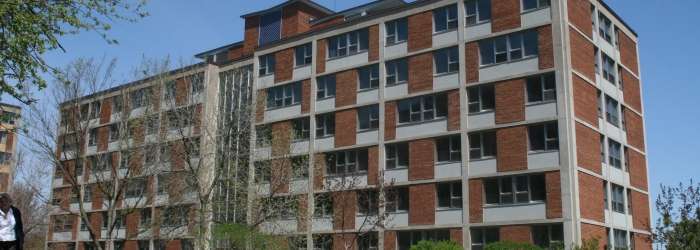Often glorified in movies, living in residence is generally considered a rite of passage for all college students. The idea behind residence systems, however, is to provide a supportive micro-environment within a larger campus to aid in the drastic transition upon entering university.
At McGill, not only do the different types of residences cater to students’ needs and personalities, but hall directors and floor fellows also work hard to make the year-long experience unforgettable.
“It’s a cool environment where you get all of the college experience at once: the studying, the partying, the no sleeping […] and everyone’s in the same situation,” U0 Music student Céleste Pagniello said.
McGill’s residence system is already well-developed to meet the needs of students according to Janice Johnson, Managing Director of Residences and Student Housing.
“There are some schools in Quebec that do a lot of programming, have floor fellows, and hall councils that do some of the stuff that we do, but we do it on a pretty significant scale,” she said.
Currently, each residence has one director, except for MORE housing, which has one hall director for the group of houses. Each building is also home to floor fellows—non first-year students who plan activities and, perhaps most critically, are there for students in times of crisis.
Several changes to this system have been planned for Fall 2014. The modified system will have full-time hall directors who are employed by Student Housing Hospitality Services, and who will be responsible for several halls. There will also be faculty members or other administration that live in halls with students.
This decision has been met with criticism from some members of the residence community concerning the accessibility of the hall directors and a lack of consultation in implementing these changes. Despite the uncertainy surrounding how this system will function at McGill, full-time hall directors are common at other academic institutions across Canada and the United States.
For example, Queen’s University has a Manager of Residence Life, an Assistant Manager, and live-in full-time professional Residence Life Coordinators who are responsible for groups of buildings. Their floor-fellow counterparts, called “dons,” are also upper-year students—even graduate students—who support new students in the transition to university life. These dons and staff live in the residences, in a similar manner to the proposed McGill system.
Similarly, the residence system at the University of Chicago focuses on providing support to their students in residence. Their system includes Resident Assistants (RAs), who are third- or fourth-year students; Resident Heads, who are advanced graduate students or administrative staff; and Resident Masters, senior university faculty members who are there to provide a large, connected support system.
One of the main differences between McGill and other universities is that McGill guarantees residence only for a student’s first year of studies. For example, not only does the University of Chicago guarantee housing for all four years of undergraduate school, it also requires that all first-year students live in residences.
However, Pagniello said she supports McGill’s decision to guarantee residence to only first-year students.
“It’s a good experience for a year, but I think it’s going to be good to move out and really live on our own,” Pagniello said.
At the end of the day, university residences are all about providing the support students need to make a smooth transition from living in a residence to living in an apartment.
“[Residence] allows students to become independent and develop new strengths in a new family-type support system,” first-year Education student Jasmine Segal said. “I feel like I’m more prepared for living on my own next year.”







